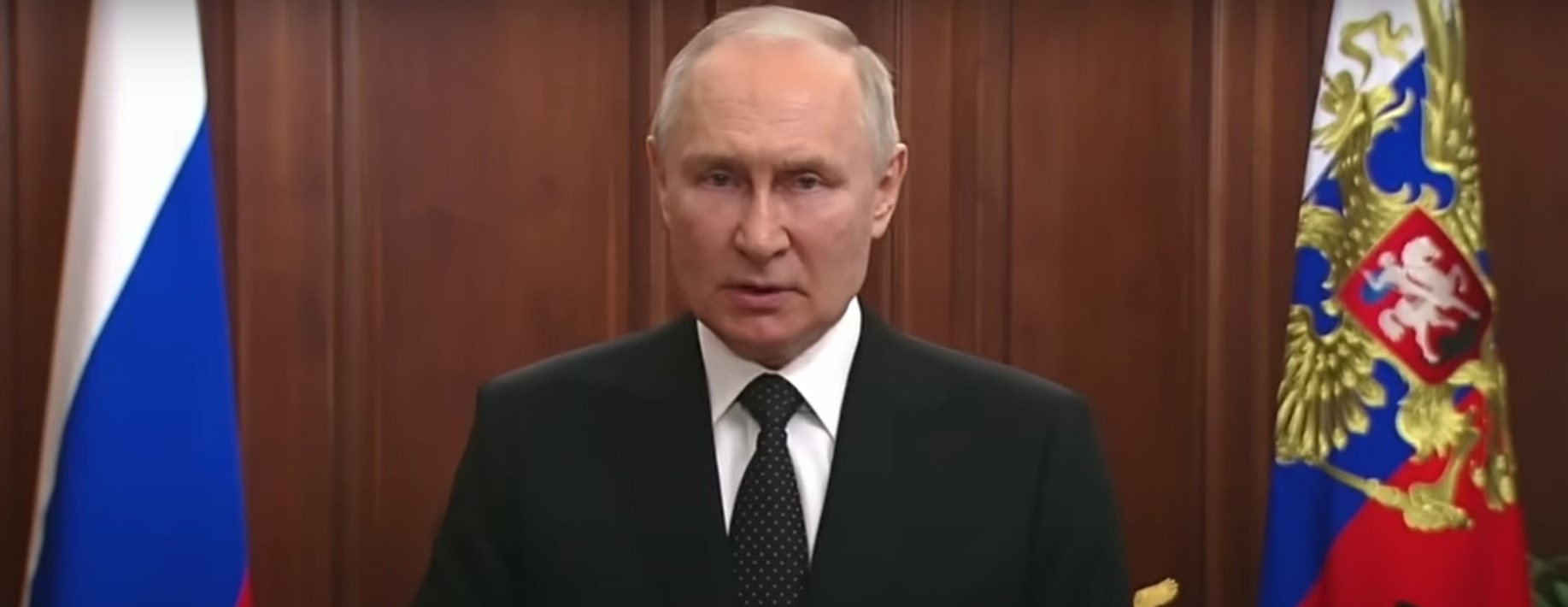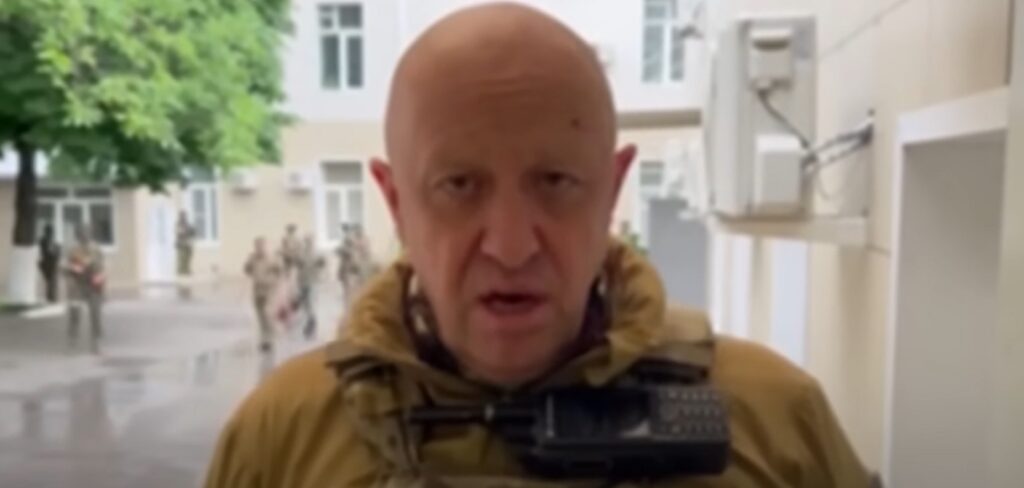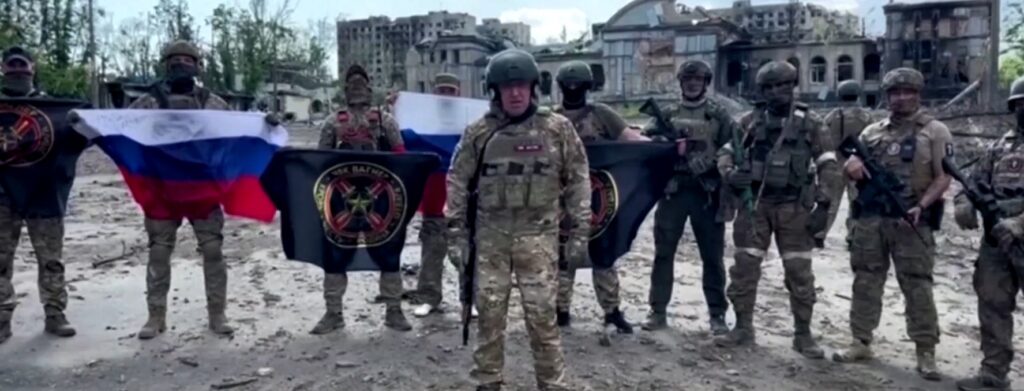
By John Pickard
The Wagner revolt against the Russian army leadership has fizzled out ignominiously and its leader Yevgeny Prigozhin, has been forced into exile. But the revolt itself is an indication of a profound crisis in the leadership of the Russian military and in the Kremlin. It may not yet be the end, but marks the beginning of the end for Putin himself.
It was Napoleon Bonaparte, perhaps Europe’s most famous military leader of all time, who said that in war, “the moral is to the physical as three is to one”. The most decisive element in the Ukraine war has indeed been the sharp difference in morale between the Russian and the Ukrainian forces. It has been the single most important factor in the failure of Russian armed forces, despite having on paper an overwhelming superiority, to capture more than a proportion of Ukrainian territory in the South and East.
Russian forces have suffered far greater casualties than have Ukrainians and although the majority of the Russian population have – up to now – passively supported their armed forces, there is far more doubt and disagreement about the war among Russians than there is among Ukrainians, who feel they are defending their homes, families and communities.
It was precisely because of the low morale of Russian regular troops that Putin was obliged to use mercenary forces in key parts of the fighting. The Wagner Group is the most important of such forces, recruiting from prisons with an offer of free pardons and higher pay. But it is not the only such force – with at least two other units, one of them paid for by the state-owned energy giant Rosneft. For the Kremlin, the use of mercenaries has the advantage of allowing casualty figures that are released to the Russian public to be massaged.
Growing friction between Wagner and regular forces
There had been growing friction, and inevitably so, between Prigozhin the founder and commander of Wagner, and regular army generals. Prigozhin alleged that his forces were deprived of ammunition at key points in the battle for the town of Bakhmut.

A week ago, Prigozhin claimed to have ‘kidnapped’ a Russian general who had been drunk. What triggered his ill-fated march on Moscow was his accusation that Russian aircraft had bombed a Wagner training facility, killing a number of soldiers.
When Prigozhin marched his forces North – by which time Wagner was no longer in the front line – he claimed to be in control of 25,000 troops, and after taking over the Russian military headquarters at Rostov, he threatened to march the rest of the way to Moscow.
During what he labelled his ‘March for Justice’ he called on the Russian army to overthrow their generals but pointedly failed to condemn Putin himself. Nevertheless, he made a number of very startling outbursts, including the allegation that the real Russian casualty figures are “ten times” higher than the numbers given to the public, and that the war had been unnecessary, and had only occurred because the generals had “tricked” Putin into it.
The reaction of the Kremlin was immediate. Putin went on television [picture top] and called the mutiny of the Wagner forces “a stab in the back”. The Russian security service, the FSB, raided the Moscow offices of Wagner. Plans were put in place to crush the mutiny.
It is not clear if Prigozhin’s claim of 25,000 troops was true or not and his rapid march North was not so much due to the regular army being ‘overwhelmed’ (as some Western press has suggested) but simply due to the absence of any regular forces defending the road north. Why would they? Whatever the actual balance of forces, the decision of Prigozhin to call off his mutiny and seek personal asylum in Belarus was an indication of weakness, not strength.
It is more than likely that the Wagner forces would have failed to get to Moscow, being without air cover and on an open road. But rather than either party face humiliation – for Prigozhin a bloody defeat, and for Putin the ignominy of an open civil war – both Prigozhin and Putin preferred an agreement mediated by Belarus.
Prigozhin: ‘dead man walking’
What is likely to happen now? Because of the friction between the regular army and Wagner, it had always been the aim of the army tops to integrate the mercenaries into the regular forces, including their command structure. It is likely that the absorption of his troops was one of the key reasons – if not the key reason – for Prigozhin’s revolt.

Now, with the end of the mutiny, that is a certainty. As for Prigozhin, he is a ‘dead man walking’ and it is only a matter of time before the Kremlin gets its hands on him, unless he flees to the West. The real ‘stab in the back’ to which Putin referred was the fact that ‘one of their own’ told some revealing truths to the Russian people and circulated his videos on line.
Wagner mercenaries have been involved in other conflicts, particularly in Africa, and with the patronage of Putin – from a longstanding personal friendship with Prigozhin – it has effectively allowed Russian intervention, without the Kremlin being ‘officially’ involved. Wagner this gave the Russian state ‘plausible deniability’ when it came to foreign interventions. That whole foreign policy methodology is now in question.
For the government of Ukraine and their international backers, the low morale of the Russian forces could not have been more sharply portrayed. The mutiny was a shock and a threat to Putin, but it was nothing but good news to Ukraine’s President Zelensky. It will have emboldened Ukrainian forces more for their counter-attack, which is currently under way.
Putin’s image as a ‘strong man’ has been tarnished
On the Russian side, there will be a perception that the Russian regime has shown itself to be weak and divided, which it clearly is. Putin, the ‘strong man’ – the judo expert who rides horses bareback – is clearly not as all-powerful as he likes his population to believe. For him, in full view of the world and the Russian population, to rely on the ‘mediation’ of the Belarus government to resolve the mutiny is a degree of humiliation he has not faced in his twenty-three years in power.
It is impossible to be certain about detailed outcomes in a situation that is by nature volatile, rapidly changing and unpredictable. Whether opposition to Putin will grow from within the circle of powerful oligarchs who dominate the Russian economy, or whether it comes from the military, it is impossible to say. But opposition there will be. The bubble has burst, and Putin’s image as a leader in full control of everything around him has been shattered.
What is equally uncertain is the further progress of the war. Russia has captured a fifth of the territory of Ukraine. Even with more modern arms, tanks and materiel from NATO countries, Ukraine will not find it easy to recapture lost ground against well dug-in Russian forces. It is another common maxim in military circles that to be successful, attacking forces need to outnumber defending forces by a large margin, and that is not the case, taking the war front as a whole.
Neither should we imagine that if Putin were to be replaced that his successor would be in any way more amenable to compromise or negotiation with Ukraine. Whoever is in the highest office in the Kremlin will not be prepared to see Russia humiliated. To be effectively broken militarily and forced to retreat from all of the captured areas – including Crimea, which is Zelensky’s aim – would be a huge great national humiliation, something no leader would be prepared to stomach. The failed mutiny, therefore, does not signal an early end to the war. On the contrary it could drag on a lot longer yet.
No comments:
Post a Comment